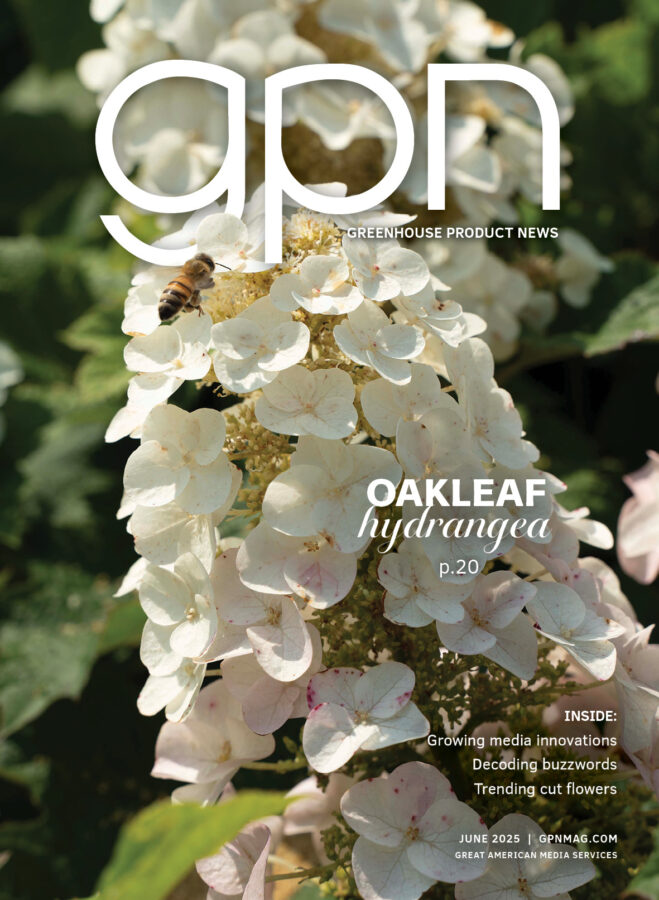A Risk Worth Taking
Big growers face big risks every day. For some companies, relying on contract growers is one of those risks not worth taking Ñnot so for Masterpiece Flower Co. For theByron Center, Mich.-headquartered company, using contract growers is an integral part of business.
“The risk can be huge!” said Masterpiece PresidentTim Stiles. There are “millions of dollars down the line that are not in your direct control. But it is a risk worth taking when you do it right,” he added.
The Masterpiece Concept
Masterpiece Flower Co. was created several years ago to manage distribution for its sister company,Henry Mast Greenhouses, a big grower also based in Byron Center. Today, Masterpiece ships millions of plants from 15 growers to about 15 different states in the Midwest.
Masterpiece Flower Co. does not actually grow any plants. It is a distribution company that buys, sells, ships and merchandises cut flowers, bedding plants, perennials and blooming potted plants to the big boxes and independents.Masterpiece has formed the relationships with buyers, Masterpiece owns the expensive trucks and Masterpiece employs all the merchandisers, allowing the growers to focus on what they do best — growing.
Masterpiece also serves as a warehouse for grocery store chain Meijer and receives other floral products for the company. Product is shipped to Masterpiece from growing operations.Masterpiece evaluates the product for quality; if accepted, signs off on the shipment on Meijer’s behalf; and enters it into a Meijer computer terminal in the warehouse. Stiles said the relationship is so close, many of these suppliers now think ofMasterpiece as Meijer’s agent.
As the relationship has progressed with Meijer, Stiles said the retailer has asked his company to take on more responsibility. “Our discussions with Meijer are very open,” Stiles commented. “We talk about where they want to go and where we can play a role. Meijer really lets us in on the operational side so we can help them. If we help them, we help ourselves,”Stiles added.
The Contract Business
According to Stiles, about 50 percent of Masterpiece’s product is grown by Henry Mast Greenhouses, while about15 contract growers in theMichigan area grow the other 50 percent. He saidMaster-piece has been using contractor growers for eight years. Most contractors are in the 100,000-400,000 sq. ft. range, but the company has growers as small as 17,000 sq. ft.
Stiles is not anxious about having half of his plants in another grower’s greenhouse. “Sure, we put a great deal of faith in that person,” Stiles said. “What happens if they mess up?Well, if they mess up, then we are hurting; grower.
“Quality is always our number one standard of selection when we pick growers,” Stiles added.”Right behind that is their ability to deliver on a timely basis because service is a big part of what differentiates us from others.”
Controlling The Risk
Proper planning helps reduce risks when choosing a contractor. When Masterpiece signs up a new contract grower, there is usually a year-long vetting process to make sure the potential contractor meets the company’s standards. And when the contractor is given an order, Masterpiece representatives are heavily involved during the first year.
“It always comes back to picking players who have a history of being precise,” Stiles explained.”The growers that are good and precise in their scheduling, ability to hold a crop, and ability to monitor and manage a crop are the ones we use.”
Most of the contract growers used are monocropgrowers. By having the grower produce only one or two crops they become experts on that crop and production becomes very formulaic. Masterpiece feels more comfortable about getting a good crop, and the contractors can be more profitable.
Helping Everyone Succeed
To minimize risk and ensure success forMasterpiece and the contract growers, Stiles and his team have developed a systematic approach to working with outside growers. “We write spec sheets that lay out all of the details — the pot, the barcode, the varieties, the colors — and ask everyone involved,’OK, do we agree on this?'” Stiles said. Then a commitment form is signed by both organizations.
Because of the history with Henry MastGreenhouses, management at Masterpiece understands what contract growers are dealing with everyday. “We really try to work with growers because we live in their world, too,” Stiles said. The proximity toHenry Mast Greenhouses also allows Masterpiece to set criteria for what it will and will not accept. “All of our standards for Masterpiece originate [at Henry MastGreenhouses],” explained Stiles, “and we try to apply those standards to the other growers. We consult our management partners, Shawn Koepnick and LeroyDevries, at Henry Mast Greenhouses when we developthe crop spec sheets we provide our contract growers.”
To help enforce these standards, Masterpiece has developed a report card for its growers to provide feedback on how they perform each year. “We have a real candid conversation and some friendly banter, but there is also some pretty pointed criticism,”Stiles said. He explained growers are rated on aspects like overall product quality, level of communication, invoice accuracy, and delivery and schedule accuracy. This report has become a real source of pride for the contractors, Stiles said.
Masterpiece Flower Co. also has a field inspector,Michael Hughes, who was a grower for Henry MastGreenhouses for 12 years. He knows what it takes to be successful, but he doesn’t micromanage the growers.”The growers manage their own production with their skills and staff, we just set the standards they have to hit,” Stiles said. The field inspector works with the contractors every day, keeping his finger on the pulse of their production, schedules and projected volume and reporting back to Masterpiece.
Risk And Reward
Another risk Masterpiece is willing to take is how it uses pay by scan. Masterpiece takes ownership of product at its dock, then ships that product out for sale under pay by scan. Stiles said Masterpiece has been using pay by scan for about six years. In some instances, he admitted, the company has paid for more product than it has sold.
“We take 100 percent of the risk,” said Masterpiece sales manager Ron Mercer. “That is why our standards have to be held very high when the product passes through the warehouse, and our growers are aware of that!”
“If we wanted to put our growers in the situation where they are sharing the risk, we would clearly have to pay them more for their product,” Mercer explained. “I think we have a healthy balance where[the growers] are pleased with what we pay them with the understanding that they have to produce high quality while we take on the risk.”
According to Stiles, the scan-based system has benefits too. It provides the company with detailed information about the sales velocity and quantity of product at each store every day. He said it also requires the company to load its trailers differently, customizing replenishment so that the right product is shipped to the correct store at the right time.
It’s all about risk and reward, whether you manage acres of greenhouses or warehouses. Masterpiece has not made their company easier to run by splitting up production and distribution, but what it has done is make a more efficient system that allows both halves to focus on what each does best, and the model seems to be working: It allocates risk where it can best be handled and shares an equal portion of reward with everyone.









 Video Library
Video Library 


















